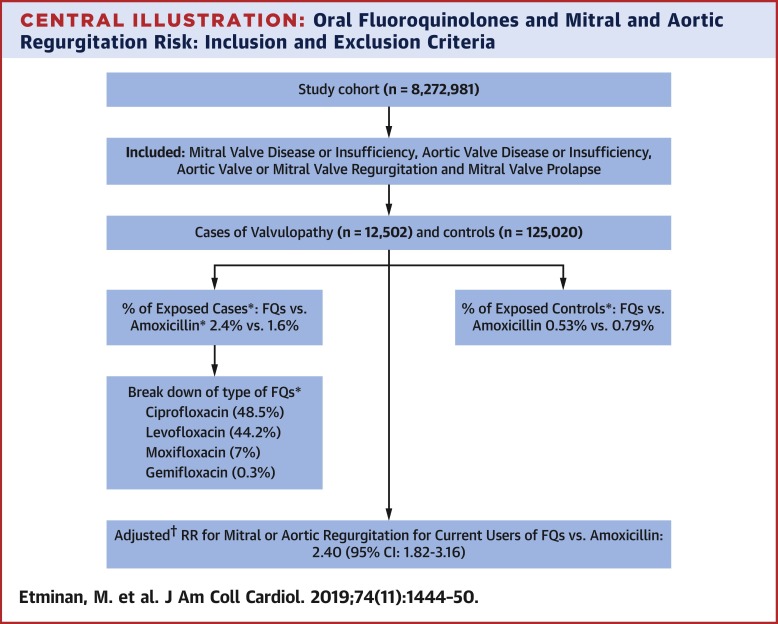当前位置:
X-MOL 学术
›
J. Am. Coll. Cardiol.
›
论文详情
Our official English website, www.x-mol.net, welcomes your feedback! (Note: you will need to create a separate account there.)
Oral Fluoroquinolones and Risk of Mitral and Aortic Regurgitation
Journal of the American College of Cardiology ( IF 24.0 ) Pub Date : 2019-09-01 , DOI: 10.1016/j.jacc.2019.07.035 Mahyar Etminan 1 , Mohit Sodhi 2 , Saeed Ganjizadeh-Zavareh 3 , Bruce Carleton 4 , Abbas Kezouh 5 , James M Brophy 6
Journal of the American College of Cardiology ( IF 24.0 ) Pub Date : 2019-09-01 , DOI: 10.1016/j.jacc.2019.07.035 Mahyar Etminan 1 , Mohit Sodhi 2 , Saeed Ganjizadeh-Zavareh 3 , Bruce Carleton 4 , Abbas Kezouh 5 , James M Brophy 6
Affiliation

|
BACKGROUND
Recent studies have linked fluoroquinolones (FQs) to cardiac adverse events, including aortic dissection and aneurysm. To date, whether FQs can increase the risk of aortic or mitral regurgitation has not been studied. OBJECTIVES
This disproportionality analysis and case-control study examined whether FQs increase the risk of aortic and mitral regurgitation. METHODS
Data from the U.S. Food and Drug Administration's adverse reporting system database was used to undertake a disproportionality analysis, and a random sample of 9,053,240 patients from the U.S. PharMetrics Plus database (IQVIA) was used for the matched nested case-control study. Current FQ exposure implied an active prescription at the index date or 30 days prior to the event date. Recent FQ exposure was defined as FQ use within days 31 to 60 and past within days 61 to 365 prior to the event date. Rate ratios (RRs) were compared to users of amoxicillin and azithromycin. Conditional logistic regression was used to compute RRs adjusting for confounders. RESULTS
The reported odds ratio for the disproportionality analysis was 1.45 (95% confidence interval [CI]: 1.20 to 1.77). A total of 12,505 cases and 125,020 control subjects were identified in the case-control study. The adjusted RRs for current users of FQ compared with amoxicillin and azithromycin users were 2.40 (95% CI: 1.82 to 3.16) and 1.75 (95% CI: 1.34 to 2.29), respectively. The adjusted RRs for recent and past FQ users when compared with amoxicillin were 1.47 (95% CI: 1.03 to 2.09) and 1.06 (95% CI: 0.91 to 1.21), respectively. CONCLUSIONS
These results show that the risk of aortic and mitral regurgitation is highest with current use followed by recent use. No risk was observed with past use of FQs. Future studies are necessary to confirm or refute these associations.
更新日期:2019-09-01


























 京公网安备 11010802027423号
京公网安备 11010802027423号